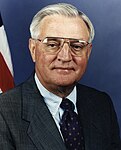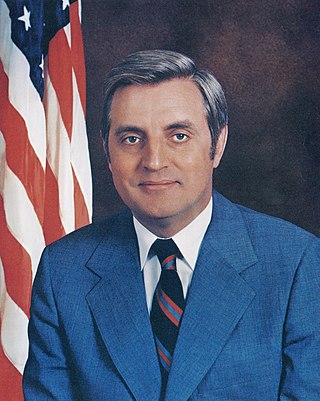
Walter Frederick "Fritz" Mondale was an American lawyer and politician who served as the 42nd vice president of the United States from 1977 to 1981 under President Jimmy Carter. A U.S. senator from Minnesota from 1964 to 1976, he was the Democratic Party's nominee in the 1984 presidential election, but lost to incumbent Ronald Reagan in an Electoral College and popular vote landslide.
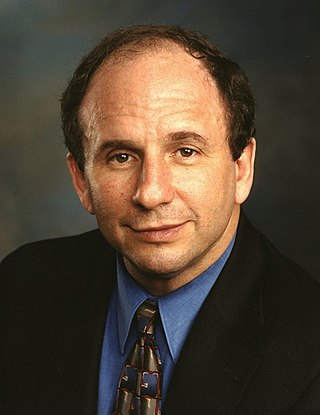
Paul David Wellstone was an American academic, author, and politician who represented Minnesota in the United States Senate from 1991 until he was killed in a plane crash near Eveleth, Minnesota, in 2002. A member of the Democratic Party (DFL), Wellstone was a leader of the populist and progressive wings of the party.

Dean Malcolm Barkley is an American attorney and politician who briefly served as a United States Senator from Minnesota from 2002 to 2003 as a member of the Independence Party of Minnesota. The founder and chair of the Minnesota Reform Party, he was the chairman of Jesse Ventura's successful upset bid for governor of Minnesota in 1998. Ventura subsequently appointed him director of the state's Office of Strategic and Long Range Planning. After Senator Paul Wellstone died in a plane crash just weeks before the 2002 election, Ventura appointed Barkley to fill Wellstone's Senate seat. His brief tenure ended when Republican Norm Coleman was elected and sworn in to fill the seat.

Norman Bertram Coleman Jr. is an American politician, attorney, and lobbyist. From 2003 to 2009, he served as a United States Senator for Minnesota. From 1994 to 2002, he was mayor of Saint Paul, Minnesota. First elected as a member of the Democratic–Farmer–Labor Party (DFL), Coleman became a Republican in 1996. Elected to the Senate in 2002, he was narrowly defeated in his 2008 reelection bid. As of 2024, he is the most recent Republican to have represented Minnesota in the U.S. Senate.
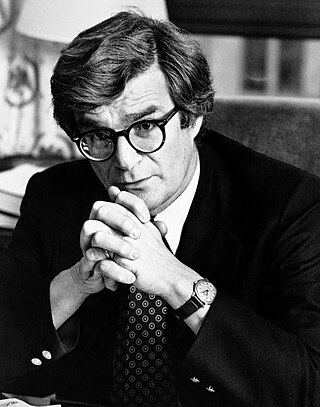
Rudolph Ely “Rudy” Boschwitz is an American politician and businessman who served as a United States senator from Minnesota from 1978 until 1991. Boschwitz is a member of the Republican Party.

The 1998 Minnesota gubernatorial election took place on November 3, 1998. Reform Party candidate Jesse Ventura defeated Republican Party challenger Norm Coleman and Minnesota Democratic–Farmer–Labor Party challenger Hubert H. "Skip" Humphrey III. Ventura governed with a DFL-controlled state Senate and a Republican-controlled state House. As of 2024, this is the only time that a Reform Party candidate has been elected to statewide office.

The 2002 United States Senate elections featured a series of fiercely contested elections that resulted in a victory for the Republican Party, which gained two seats and thus a narrow majority from the Democratic Party in the United States Senate. The Senate seats up for election, known as class 2 Senate seats, were last up for regular election in 1996. The election cycle was held on November 5, 2002, almost fourteen months after the September 11, 2001 attacks.
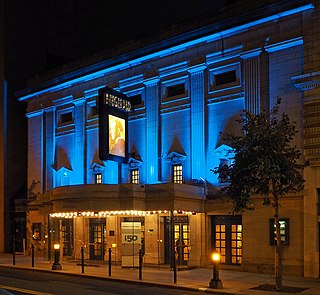
The Fitzgerald Theater is the oldest active theatre in Saint Paul, Minnesota, and the home of American Public Media's Live from Here. It was one of many theaters built by the Shubert Theatre Corporation, and was initially named the Sam S. Shubert Theater. It was designed by the noted Chicago architectural firm of Marshall and Fox, architects of several theaters for the Shuberts. In 1933, it became a movie outlet known as the World Theater. The space was purchased by Minnesota Public Radio in 1980, restored with a stage in 1986 as a site for Prairie Home, and renamed in 1994 after St. Paul native F. Scott Fitzgerald.

The 2006 United States Senate election in Minnesota took place on November 7, 2006. Incumbent Senator Mark Dayton announced in February 2005 that he would retire instead of seeking a second term. Fellow Democrat Amy Klobuchar won the open seat by 20.2 percentage points. Primary elections took place on September 12, 2006.

The 2002 Minnesota gubernatorial election took place on November 5, 2002 for the post of Governor of Minnesota. Republican candidate Tim Pawlenty defeated Democratic candidate Roger Moe and Independence Party of Minnesota candidate Tim Penny. Due to personal reasons regarding the health of his spouse, incumbent Governor Jesse Ventura chose not to seek re-election. Pawlenty comfortably won the election, which was attributed in part to Moe's uninspired campaign, with Moe being dubbed a "cautious dullard" four years later by the City Pages.
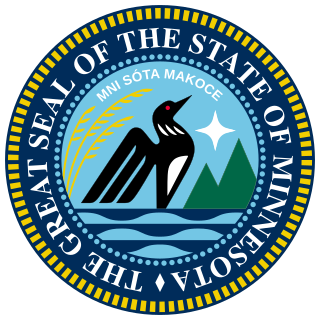
Minnesota is known for a politically active citizenry, with populism being a longstanding force among the state's political parties. Minnesota has consistently high voter turnout; in the 2008 U.S. presidential election, 77.8% of eligible Minnesotans voted – the highest percentage of any U.S. state or territory – versus the national average of 61.7%. This was due in part to its same day voter registration laws; previously unregistered voters can register on election day, at their polls, with evidence of residency.

The 2008 United States Senate election in Minnesota took place on November 4, 2008. After a legal battle lasting over eight months, the Democratic–Farmer–Labor Party (DFL) candidate, Al Franken, defeated Republican incumbent Norm Coleman in one of the closest elections in the history of the Senate, with Coleman's Senate predecessor Dean Barkley taking third place. Franken took his oath of office on July 7, 2009, more than half a year after the end of Coleman's term on January 3, 2009.

Electoral history of Walter Mondale, who served as the 42nd vice president of the United States (1977–1981); as a United States senator from Minnesota (1964–1976), and as the 23rd attorney general of Minnesota (1960–1964).

The 2000 United States Senate election in Minnesota was held on November 7, 2000, to select a U.S. senator from the state of Minnesota. The race pitted incumbent Republican Senator Rod Grams against former Minnesota State Auditor Mark Dayton. Dayton won with 48.83% of the vote to Grams's 43.29%. Dayton declined to run for reelection in 2006 and ran successfully in 2010 and 2014 for governor of Minnesota. He was succeeded in the Senate by Amy Klobuchar, who has held the seat ever since. Upon Dayton's swearing in, Democrats held both of Minnesota's U.S. Senate seats for the first time since 1978. As of 2024, this is the last time that a man won the Class 1 Senate seat in Minnesota.

The Independence—Alliance Party, a merger of the Alliance Party and the Independence Party, formerly the Reform Party of Minnesota, is a political party in the U.S. state of Minnesota. It was the party of former Minnesota governor Jesse Ventura when he left the Reform Party.

The 2000 United States presidential election in Minnesota took place on November 7, 2000, as part of the 2000 United States presidential election, which was held throughout all 50 states and D.C. Voters chose ten representatives, or electors to the Electoral College, who voted for president and vice president.
Elections were held in Minnesota on November 4, 2008. Primary elections took place on September 9, 2008.
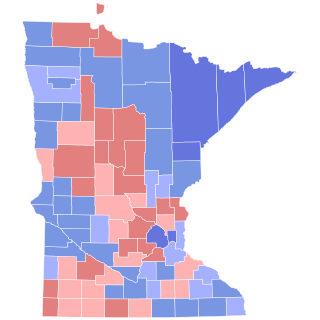
The 2014 United States Senate election in Minnesota was held on November 4, 2014, to elect a member of the United States Senate to represent the State of Minnesota, concurrently with the election of the Governor of Minnesota, as well as other elections to the United States Senate in other states and elections to the United States House of Representatives and various state and local elections.
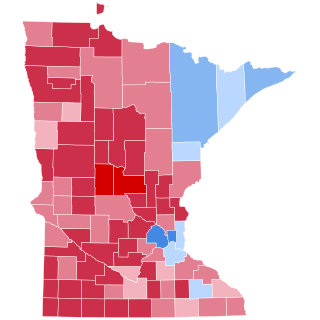
The 2016 United States presidential election in Minnesota was held on Tuesday, November 8, 2016, as part of the 2016 United States presidential election in which all 50 states plus the District of Columbia participated. Minnesota voters chose electors to represent them in the Electoral College via a popular vote, pitting the Republican Party's nominee, businessman Donald Trump, and running mate Indiana Governor Mike Pence against Democratic Party nominee, former Secretary of State Hillary Clinton, and her running mate Virginia Senator Tim Kaine. Minnesota has ten electoral votes in the Electoral College.
A general election was held in the U.S. state of Minnesota on November 3, 2020. All seats in the Minnesota Senate and Minnesota House of Representatives were up for election as well as several judicial seats, Minnesota's 10 presidential electors, a United States Senate seat, Minnesota's eight seats in the United States House of Representatives, and several positions for local offices. A primary election to nominate major party candidates and several judicial and local primary elections were held on August 11, 2020.


